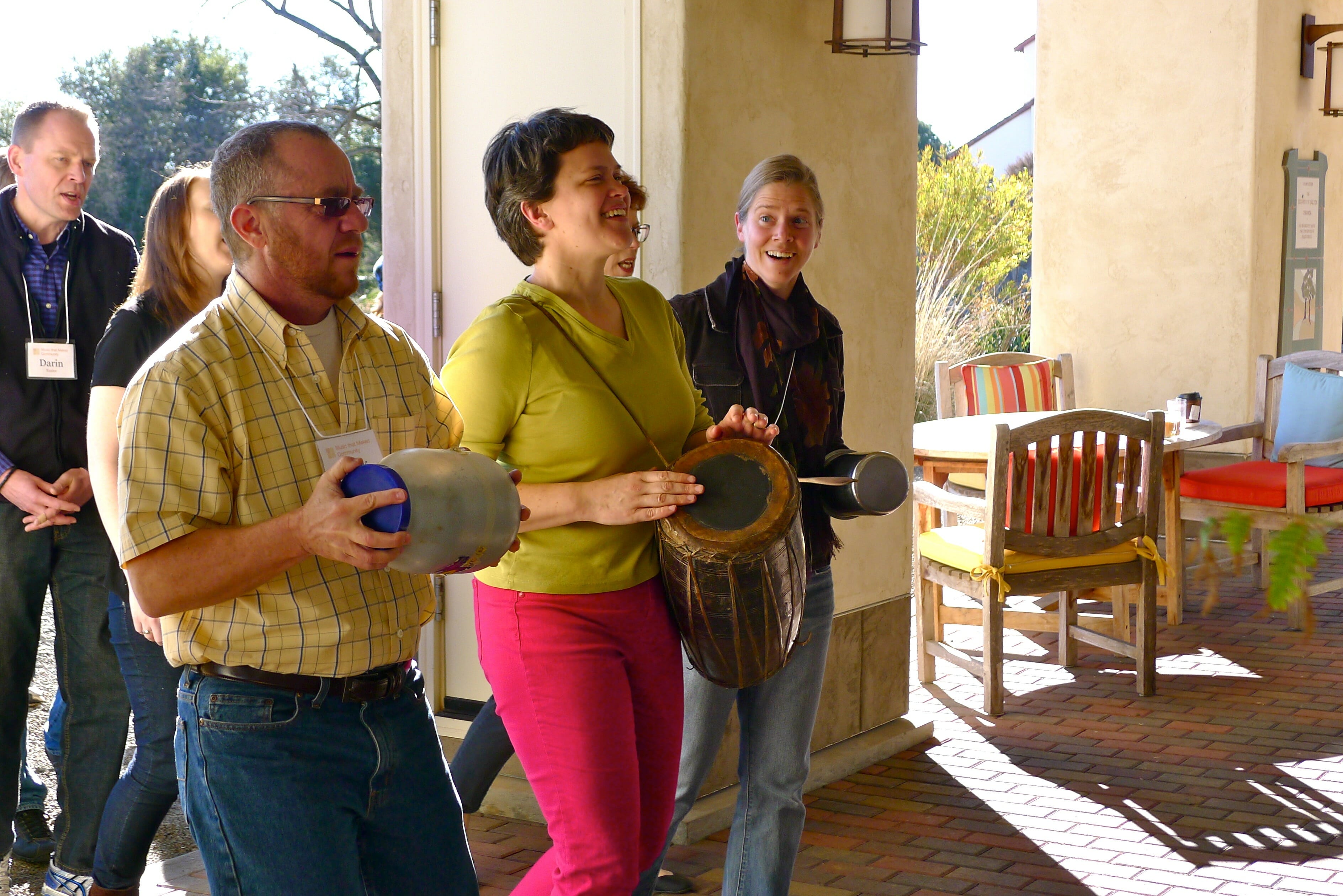
Music that Makes Community, Inc., a not-for-profit organization, connects a worldwide network of practitioners and leaders who share a practice of paperless song leading.
Photograph courtesy of Music That Makes Community
My love for music was disrupted, however, at age 20, when I sang as my mother died. I became unconsciously fearful of the power of my voice. I sang less and less in front of people, relegating my voice to private spaces, often claiming it was more worshipful to sing for God alone.
Thankfully, I continued to be involved in the life of congregations, both in the pews and the pulpit, and weekly worship was and is a safe place to sing. I have a voice created for the range of the soprano line in every hymn. While singing alone felt unbearably risky, singing with others in church continued to feel like a gift.
Yet I desired to more fully reclaim my love for music and my comfort in sharing my voice with others. During a chapel service at a conference, a song leader shaped our shared singing in a way that felt different—more engaging of the community, more expressive, open and free. Something inside me was stirred, and I went searching for the song; what I found was Music that Makes Community (MMC).
According to its website, MMC is a “non-profit organization working with ecumenical communities and leaders to empower and liberate communities’ spiritual life through singing.”
The facilitators use both ancient and new ways of sharing “paperless singing”—free from hymnals, songbooks and screens—to focus attention on our bodies, our breath and each other as we make music together. My intuition that God was calling me to these people and this practice was so strong that I registered for a three-day workshop within the hour.
The experience of being with MMC exceeded my hopes and expectations, unformed though they were. When we arrived, we gathered in a circle, as a single singing voice greeted us. At his gesture, we joined in, and the leader stepped out of the center to join the circle, passing the song to our shared keeping. We trusted ourselves and the simple melody and, although we did not know each other’s names or “vital statistics,” we were already creating together—we were breathing, acting and living as one.
Over those three days, I led songs, rediscovered my joy in improvisational harmonizing and “caught” (wrote) a song in seconds when the words of Frederick Douglass hanging on the wall met a melody that came from somewhere deep within my soul. As I prepared to return home from the workshop, I wrote this message to my spouse:
I experienced and witnessed so much: that everyone’s voices are imperfect and falter and that even leaders can start on the wrong pitch, lose the song, or need to start over. They modeled this fact quite intentionally and authentically. The more scared and shaky people were as they brought themselves forward, the greater the presence/love/support of the group. I saw that I am not alone in crying to music that moves me. I felt fully loved, fully engaged and as though my earlier understanding of music (something I had to do “well”) has evolved into an understanding that music is something I must create regardless (no “well” about it), ideally in community.
….that we belong to one another.
….that God prefers the most vulnerable among us.
….that the quietest voices can hold the greatest power.
….that we have the responsibility and capacity to heal ourselves and our world.
….that there is enough and some to share.
Jennifer L. Sanborn is
Sanborn and her colleague, Music that Makes Community Executive Director Paul Vasile, will present “Music that Makes Community: Singing Together Heals the World” at ABHMS’ “Space for Grace: Thy Will Be Done,” November 14-16, 2018, in Philadelphia. REGISTER TODAY for this national conference that seeks to explore critical issues of mission engagement, discipleship and church transformation facing Christians today.
The views expressed are those of the author and not necessarily those of American Baptist Home Mission Societies.

